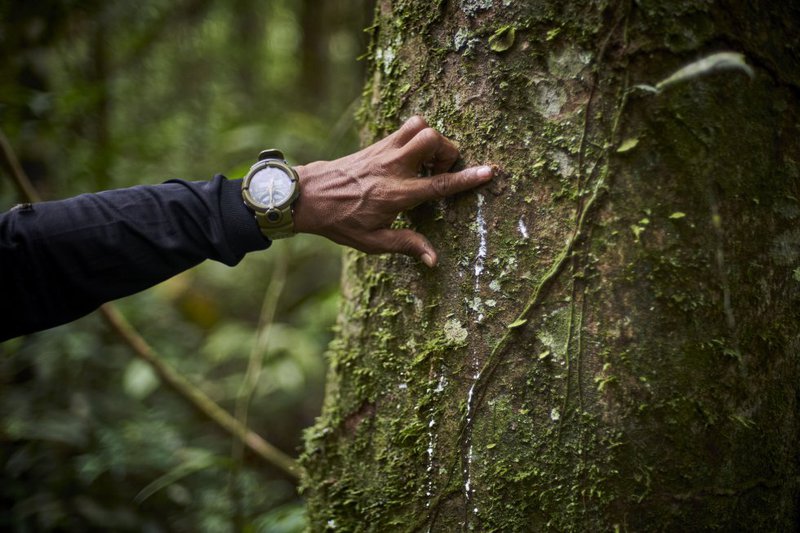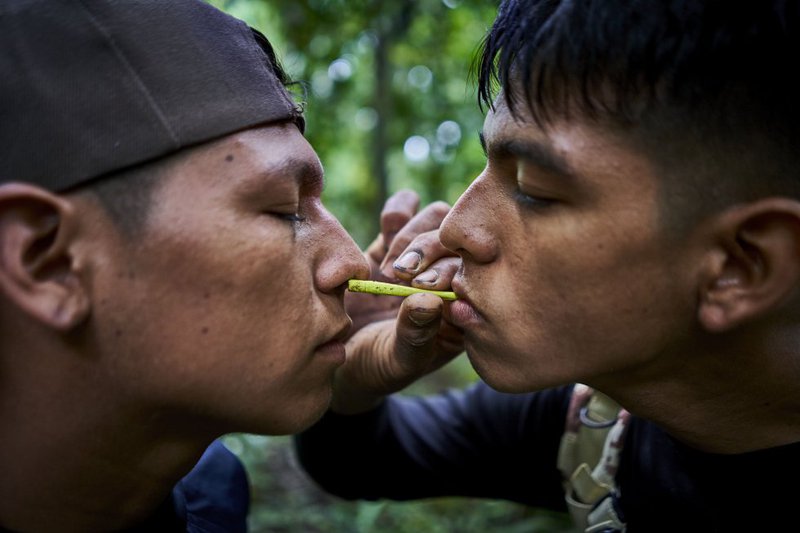
For the Tikunas, as for most indigenous Amazonian peoples, the forest contains everything they require. “There is everything we need, and it is ours. Our life comes from the forest, our gods, the Yakuruna, the water. Without the forest, everything will be lost, our life will cease,” says José Gregorio. “Everything in San Martín and in the Amazon rainforest exists and lives because we have taken care of it for millennia because it is a legacy from our ancestors.”
José Gregorio looks deep at the Amacayacu River and sees a world where the equilibrium is fragile, where he wants to preserve at all costs and employ as many young people as he can in its conservation. With his dreamy eyes and gazing out beyond the thundering curtain of water in the rainforest, José Gregorio has a message for the outside world, the one he decided to leave when he was young to come back to San Martín: “To those living in the outside world I would say: worry about your way of life. Reduce mass consumption. Remember that what we have left is already very little. That we are running out of air, of clean water. We have to think about the future.”
 Bebeto, uno de los jóvenes de la G.I.A. sopla rapé en la nariz de Christian, uno de sus compañeros, durante una recorrida de rutina. El rapé es un polvo hecho de una mezcla de tabacos y otras plantas medicinales, considerado una medicina tradicional. | Pablo Albarenga
Bebeto, uno de los jóvenes de la G.I.A. sopla rapé en la nariz de Christian, uno de sus compañeros, durante una recorrida de rutina. El rapé es un polvo hecho de una mezcla de tabacos y otras plantas medicinales, considerado una medicina tradicional. | Pablo AlbarengaLate in the afternoon, the rain stops, and José Gregorio goes for a walk. He walks along the trail, together with some members of the indigenous guard, dressed in his green camouflage T-shirt, his swamp boots, and his matching hat. Suddenly, on the banks of the Amacayacu River, which is almost overflowing, he stops in front of an immense, monumental tree.
Like an ancient spirit, aware that what he is about to say is a prediction, full of commitment he fixes his eyes on the water and with a voice both mysterious and wise, he says: “At some point, nature will make decisions for us. And when it does, for us no one will have the power to control it. The sun will take revenge, and there will be no stopping it”.
A few weeks after he uttered these words, the whole world entered the Covid-19 crisis. Most probably, José Gregorio is now pondering: “I warned you guys that nature was going to take its revenge.”
Mobility restrictions due to the pandemic have caused the indigenous environmental guard to significantly reduce their tours of the area. In addition, disposable income for canoe engine fuel fell dramatically.
Contacted at the beginning of August, José Gregorio said that they have restarted the operations of environmental control of the territory and that, in relation to the disease, there are cared for with jungle plants that protect and contribute to the resilience of these battered Amazonian communities, determined to survive all evils since the ancient times of colonization.
***
This article, originally published inEl País, 1 belongs to a series about defenders of the forests that can be visited following this link. 2 The series started in Brasil and Ecuador and now continues in Colombia. It is a project of openDemocracy / democraciaAbierta, and has been carried out with the support of Pulitzer Center’s Rainforest Journalism Fund.